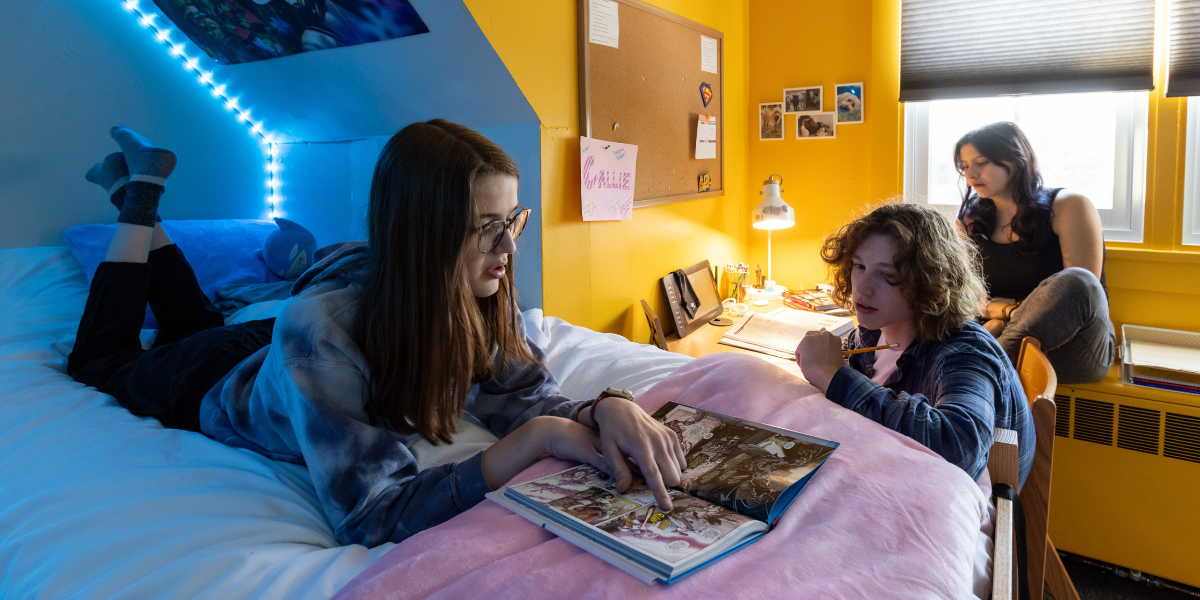Small is Beautiful: Education as if Every Student Really Mattered
In the small, beautiful, lakeside community of Burlington, there are both the advantages of a city — public transportation, rich cultural...

The other day, a visitor to Rock Point School noticed the many dogs we have in the building. He asked, “Are these all therapy dogs?” I paused before answering with a grin, “Therapy with a small t …” While our dogs are not certified therapy animals, they serve an informal therapeutic purpose for our students. This is just one example of how a school, particularly a small residential boarding school, can provide therapeutic supports without being a “big T” Therapeutic school.
Students often seek out a dog to spend time with when they are stressed or anxious; taking care of dogs teaches them empathy and responsibility; and the dogs provide nonverbal love and affection. As you look for the right school, you may be considering if a therapeutic school is a good fit or if your child might thrive in a less structured environment with support.
There is a broad spectrum of schools offering many different kinds of academic and emotional support. At one end of the spectrum are therapeutic programs, which focus first and foremost on social and emotional growth, with academics taking a back seat. These programs offer clinical support, including individual, group, and family therapy. The academic component of most of these programs is often geared toward self-paced work, with one-on-one tutorials to support students (even when the students are gathered together in what approximates a small class). At the other end of the spectrum are competitive, traditional college-preparatory schools.
Our school, Rock Point School, works with students in transition from full-time therapeutic programs, as well as with students who have struggled at home and at school and who want to take advantage of our structure and support to get “back on track.” Rock Point is often referred to as “therapeutic with a small ‘t’” because we have many therapeutic elements in our program, but with a broader focus on academics and leadership opportunities for our students, most of whom are college-bound.
To us, therapeutic with a small “t” includes promoting health and wellness. Having a structured day, eating and sleeping well, exercising, making friends, finding a passion, taking on leadership activities, and feeling successful in school and life are clearly therapeutic.
Here are a few things to consider when deciding what kind of school is right for you and your child.
The major difference between therapeutic with a big “T” and therapeutic with a small “t” is having psychologists and therapists on staff. While therapeutic schools have therapists and psychologists on campus and students may meet with them daily, small “t” schools will not. Some schools, like Rock Point, may facilitate a student attending therapy off campus or consult with a therapist to help support a student. If you believe your child would benefit from counseling, it is important to ask each school how they would provide this support.
Many schools provide unofficial therapeutic support, such as an advising or mentoring system. While an advisor may not replace a certified therapist, they frequently nurture and support a student, sometimes in a “therapeutic” way. For example, an advisor may help a student set goals (personal and academic) and track their progress. They also may communicate with parents regarding a student’s progress, goals, and needs. A mentor may help a student navigate school systems, model appropriate behaviors, and support a student through transitions. These relationships can be invaluable to a student, particularly at a new school.
At a Therapeutic School, students are generally supervised by staff at all times, especially when they first arrive. This means there is very little “unstructured” time and staff are constantly present to process behaviors with students. Frequent bed checks through the night are required, and students do not go off campus or walk around campus without staff members.
This level of supervision is very helpful for students who are in crisis and need intervention from adults to keep them safe, help them learn new coping strategies, and help them break negative habits of mind. It can be particularly helpful for students with addiction issues and other self-harming behaviors.
At a “small t” school, students will be supervised throughout the day, but there are a few “open” times throughout the day when students can determine their own schedule. Students are able to gradually become more independent as they earn privileges, such as the ability to go off campus without staff and the ability to do fewer “structured” weekend activities. Staff members frequently help students process their behaviors and interactions, but in a more organic fashion - not in formal group therapy. We find this level of supervision is helpful for students who want to work on their time-management, build their social skills, practice healthy coping skills, and need mentoring from caring adults.
At a traditional boarding school, students are less supervised and able to determine their schedule independently. For students who are self-motivated and ready for independence, this can be a great opportunity for them to stretch their wings.
Many Therapeutic boarding schools do not allow students unsupervised access to computers, cell phones, or other means of communication, especially when they first arrive. This is to help students focus on themselves and the therapeutic work they are asked to do.
Like many things at “small t” schools, the approach to technology may vary widely, but the goal will be to help students find a healthy way to interact with technology. This could mean students would not have access to their cell phones when they first arrive at school, but may be able to quickly earn access. Students would likely be supervised when on computers and have limited access to technology in their dorms. While those are “restrictions,” the most important thing a school can do is work with each student to help them use technology appropriately, in ways that will help them be successful in their lives. This can look different for every student. While some students are working on coding projects, others need to be taught how to use social media in safe and healthy ways. If your child would benefit from structure and limitations on technology use, it is important to explore how schools approach this challenging issue.
Therapeutic boarding schools are designed to help students develop coping skills, meet therapeutic goals, and grow socially and emotionally. Most Therapeutic schools maintain some kind of educational component and much of it is self-paced and in one-on-one tutorials. While this kind of work is valuable, many students at Therapeutic schools feel they need to return to a high school classroom eventually, especially if they are interested in college.
Small, structured schools like Rock Point provide the best of both worlds. Classes are small enough that students are able to share their ideas, get lots of attention from teachers, and develop their voices, while building discussion and social skills. Because of the small class size, and because teachers at small schools usually spend time with students outside the classroom, teachers come to have a good understanding of students’ personalities, as well as their academic strengths and weaknesses. At a supportive school, teachers will seek to work with each student at an instructional level that is challenging but not overly frustrating. To this end, teachers modify assignments so that they are appropriate to each student’s readiness and ability. Modifications may range from allowing books on tape for students whose decoding and reading abilities are not at grade level, to enriching a student’s curriculum with additional reading and assignments.
Ultimately, when you are looking for a school for your child, you want to ensure she or he will be cared for, both academically and personally. For many parents, finding a school that is “in the middle” between traditional boarding schools and Therapeutic schools can be a challenge. After all, a “small t” therapeutic school, like our dogs, does not come with that label! As you’re considering what kind of school would be the best fit for your child, consider what level of support, both emotional and academic, would be beneficial. The categories above are a great place to start when asking questions. And of course, visiting a school is ultimately the best way to determine if it is the right fit.
On The Point Blog: Helping Teens Transition After Therapeutic Programs
All Kinds of Therapy: A directory of resources on interventions, treatment types, and experts for your troubled teen, young adult & family system
Boarding School Review: Is A Therapeutic School What You Need?
Troubled Teens: Pros and Cons of Therapeutic Boarding Schools and Residential Treatment Facilities for Troubled Teens
Editor's note: This post was originally published in February 2016 and was updated for accuracy and comprehensiveness in February 2023.

In the small, beautiful, lakeside community of Burlington, there are both the advantages of a city — public transportation, rich cultural...

Adolescence is a time of enormous growth and self-discovery. As teens navigate who they are, how they fit in, and what matters to them, they need...

“But what do you do in the winter?” is a question that I hear frequently from people outside Vermont when they learn about our small boarding and day...